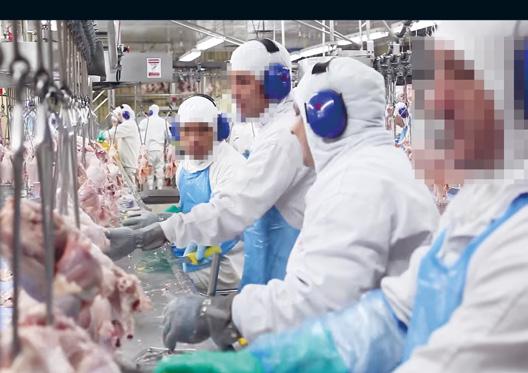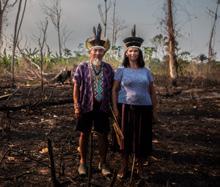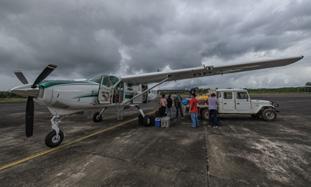
6 minute read
The system: how does ‘cattle laundering’ work?
July 2019: Screenshots of Facebook social media post show JBS-branded livestock truck reportedly being used to collect cattle from a farm that has been embargoed.

The system: how does ‘cale laundering’ work?
1
Land, often public, is deforested and subdivided
4
SLAUGHTERHOUSE
The ‘clean’ farm sells the irregular cattle to the slaughterhouse, effectively hiding the trail of destruction
2
Cattle are introduced in recently deforested areas
?
5Without the control of all suppliers, direct and indirect, meat from deforestation ‘contaminates the entire value chain
3
After a while, the cattle grazing in the deforested areas are sent to another farm without irregularities like land grabbing or deforestation
SLAUGHTERHOUSE
SUPERMARKET
6And it is sold to supermarkets, mixed with other products made without irregularities
An accomplice in the cattle laundering process?
While JBS remains apparently unable to monitor its indirect suppliers, a new investigation by Repórter Brasil and the Bureau of Investigative Journalism88
suggests that the company must be aware of the identities of at least some of its direct suppliers’ own suppliers, as it appears to be routinely involved in the transportation of cattle between the farms where they are reared and farms that fatten cattle for slaughter, including farms that are direct suppliers to JBS itself. This transport activity is reportedly undertaken by JBS’s own transportation subsidiary – in May 2019 the logistics coordinator of JBS’s Brazilian beef business unit Friboi89 even gave an interview to a Brazilian TV channel in which he spoke of offering ranchers the option of a cost-saving ‘three-legged journey’ in which the same trucks transport lean cattle from the farm where they have been reared to the farm where they will be fattened, before departing the farm laden with fattened cattle to be transported to the slaughterhouse.90 There is a strong risk that at least some of the cattle that JBS transports to its direct suppliers are ultimately purchased by the company, making the farms from which it transports them its indirect suppliers.
Moreover, in at least one instance JBS trucks and employees appear to have transported cattle from a farm in Mato Grosso state (Fazenda Estrela do Aripuanã) that was embargoed for deforestation in 2014 – and which has been the location of a number of recent forest fires – to another farm with the same ownership (Fazenda Estrela do Sangue), from which two JBS slaughterhouses received a total of around 7,000 animals between November 2018 and November 2019. Fazenda Estrela do Sangue is certified under SISBOV (a supply chain traceability scheme coordinated by the Ministry of Agriculture, which is voluntary but required by certain export markets – see page 15), meaning that it can export animals to the EU.91 GTAs, which must be filed every time a consignment of livestock is moved, show that a large number of cattle (again around 7,000) were transported from the embargoed farm to its sister operation between June 2018 and August 2019, by unspecified hauliers.92 However, social media posts by a JBS driver show that in July 2019, a convoy of five JBS trucks transported cattle on this route.93 Given that transportation of cattle to its direct suppliers from other farms is reportedly a routine activity for JBS (as the TV interview mentioned above makes clear), it seems reasonable to suppose that this may not have been the only time the company was involved in transferring cattle from Fazenda Estrela do Aripuanã to Fazenda Estrela do Sangue. In any event, the one transport in which its involvement is documented shows that JBS must have been aware that its direct supplier Estrela do Sangue was receiving cattle originally reared at Estrela do Aripuanã. Further, given that details of the embargo on the latter farm appear in a publicly accessible IBAMA database,94
it had no justifiable excuse not to be aware that the farm was embargoed for deforestation. It is hard to see how JBS can explain its failure to do due diligence on:
1.
2.
3. A farm from which it has undertaken to carry out haulage; A supplier, of whose identity it was demonstrably aware, to its direct supplier; Its own cattle supplies, if – as seems likely – at least some of the cattle transported from Estrela do Aripuanã to Estrela do Sangue during 2018–19 ended up ultimately being purchased from the latter farm by JBS.

7 April 2020, Colorado, USA: Screenshot from local news broadcaster Denver7 reporting threat from Greeley City’s Department of Public Health to shut down the JBS Greeley meat processing facility over worker Covid-19 concerns, notably lack of social distancing and pressure on workers. Source: https://youtu.be/KDDzLiNFg7s
JBS Tolleson, Arizona, USA
28 May 2020, Arizona, USA: Screenshot from local news broadcaster ABC15 Arizona reporting JBS meat processing facility in
Tolleson twice declined
Arizona state’s offer to help with Covid-19 testing.
Source: https://youtu.be/ Lg6TVI4s1gM

Risk factor: public health

JBS/Seara, Dourados, Mato Grosso do Sul, Brazil
9 May 2018, Brazil: Screenshot from JBS promotional film shot inside the Dourados JBS/Seara meat processing facility to publicise its winning of a 2017 excellence award. In July 2020 1,000 workers at this site tested postive for Covid-19. Source: https://youtu.be/nbMMUU3FIDM In July 2020, mass testing at a JBS pork processing facility in Dourados in Brazil’s Mato Grosso do Sul state revealed an outbreak of Covid-19, with more than 1,000 of the 4,300 labourers – many foreign – testing positive.95 The JBS plant ‘was the initial focus for the outbreak’ according to an infectious diseases specialist for the state health services.96 Many of the facility’s Indigenous workers live in nearby reserves, where more than 150 people were subsequently infected according to an Indigenous nurse who works in the reserve. The town reportedly became the epicentre of the virus within the state, with around 3,500 cases as of 14 July 2020.97
JBS is ‘one of four domestic meat suppliers to have a plant banned from exporting to China amid concern over coronavirus infections’.98

‘By failing to effectively monitor for illegally grazed cattle entering its supply chain, JBS fails to carry out adequate due diligence as established under the UN Guiding Principles on Business and Human Rights. Under the terms of the UN Guiding Principles, JBS contributes to human rights abuses against Indigenous peoples and residents of Reserves by participating in the economic incentives for cattle illegally grazed in protected areas.’ 99
Amnesty International, July 2020
‘Because it’s an invasion, [loggers and ranchers] set fire to the forest and start making fences, putting cattle on the land, in that order. After cattle [comes] agriculture and that’s the way they’re getting in.’ 100

Giovani Tapura, Manoki leader, Irantxe Indigenous Territory

15 September 2019, Acre, Brazil: Members of the Huni Kuin Indigenous community stand in the burnt remains of their lands – they are determined to reforest to preserve their culture and knowledge of natural science and medicine. ©David Tesinsky/Greenpeace
15 May 2020, Amazonas, Brazil: Through the ‘Wings of Emergency’ Project, Greenpeace Brazil and Instituto Socioambiental (ISA) transport hygiene kits and hospital supplies as well as sewing machines and fabric to produce masks to São Gabriel da Cachoeira, one of the Brazilian cities most impacted by Covid-19. ©Marcos Amend/ Greenpeace
9 June 2020, Amazonas, Brazil: Through the ‘Wings of Emergency’ Project, Greenpeace Brazil delivers hygiene kits and mattresses to the Indigenous Primary Care Unit (UAPI) in the Alto Rio Negro Indigenous land in São Gabriel da Cachoeira. ©Christian Braga/Greenpeace
‘Since the Bolsonaro government began, working conditions in the fields have worsened. The employer thinks that because he has elected a president who defends only the entrepreneur, anything goes.’ 101
Jorge Ferreira dos Santos, coordinator of the Rural Employees of the State of Minas Gerais (Adere-MG)










